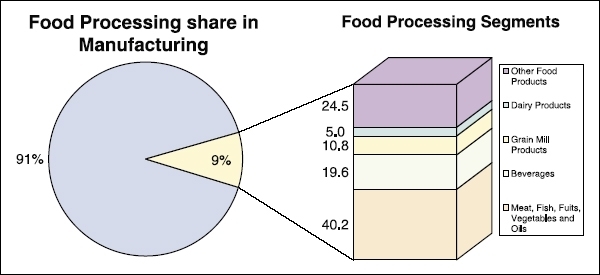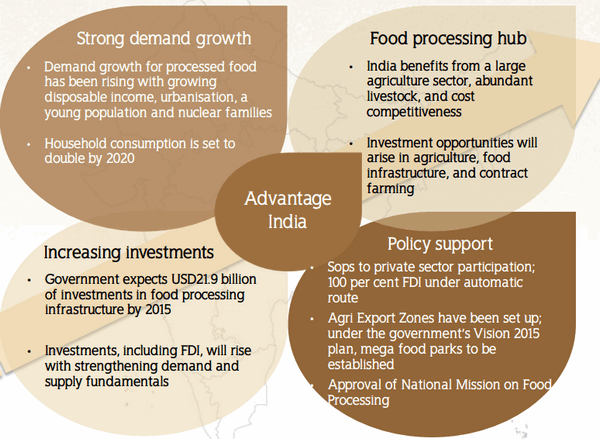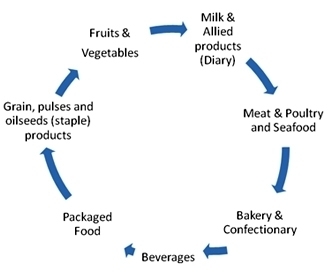Food is very important part of a civilization. It is characterized by any plant or animal material, consumed for nutrition and sustenance. Since the collection, preparation and distribution of food has been the very basis of civilization, culture and home, humanity has always recognized the value of preserving food.
This preservation of food ensures availability in times of need by means of pickling, salting, drying, etc. therefore, food processing is a multi-faceted endeavor and has increased importance for a agriculture economy and society like ours. Food processing basically takes harvested crops (or animal products) and adds value to them using different techniques to produce long shelf-life food products.
Significance of Food Processing Industry in India:
The Food processing industry holds enormous significance for India’s economic development.
- It provides vital linkages and synergies between the two pillars of economy – industry and agriculture.
- With fast growth in food processing sector along with improvement in value addition chain, favourable terms of trade can be obtained by Indian agriculture.
- Food processing industry in India contributes about 9-10% of GDP in the Agro-Manufacturing sector.

- The food processing industry in India can make crucial contribution in the nation’s food security.
- Under the light of post-harvest losses of about 25 to 30 % in our country, food processing industries are required to tap the wastage.
- Tapping these post harvest losses will improve income levels of farmers while strengthening food security.
- A well-developed food processing industry will lead to an increase in farm gate prices.
- When the wastage will be reduced, there will be value addition to the farm products improving farmer’s economic condition. This will also increase country’s export earnings.
- A robust food processing industry will also promote crop diversification. The farmers will have incentive to grow different crops according to market demands and the capability of the soil to sustain production.
- It brings synergy between the farmer, industry and the consumer. Therefore, food processing is being considered a potential source for driving the rural economy.
Scope of Food Processing Industry in India:
The food processing industry shows a tremendous scope for exports. The export of processed foods, particularly the processed fruits and vegetables, animal products, rice, marine products and other processed foods has been increasing steadily over the years, the main destinations being the Middle East and Southeast Asia. Globalization has led to an increased trade across countries especially, the processed food exports and related products have been rising steadily.
India has increasingly become a global outsourcing hub, with large retailers across the world sourcing from India due to its abundant raw materials, supply and cost advantages. India has, therefore, a great potential for global trade in agricultural and processed food products.
Food processing industry has the largest employment generation potential in India. It already generates 54,000 persons per Rs.1000 crore investment when compared to textiles and in paper industries which stand at 45,000 and 25,000 persons respectively.
The Food Processing industry has more than 35000 registered units with an Output of approx. 5-6 lakh crores.
Location of Food Processing Industry:
Presently, maximum factories related to Food processing are mainly in the Coastal states of Andhra Pradesh, Maharashtra, Karnataka, Kerala, Gujarat, Punjab, West Bengal. Some agriculture related states like Uttar Pradesh and Punjab also have more than 1000 units.
It must be noted here that majorities of the food processing factories are concentrated in the coastal states of India.
If the Food processing industry in India grows in all the states, then it would be able to curb or reduce to a large extent, the problem of migration. These industries near villages and small town will alleviate poverty among villagers, by reducing disguised unemployment and exploitation of farmers. This will help resolve the problems of rural-urban migration and unplanned urbanization of cities will be reduced.





